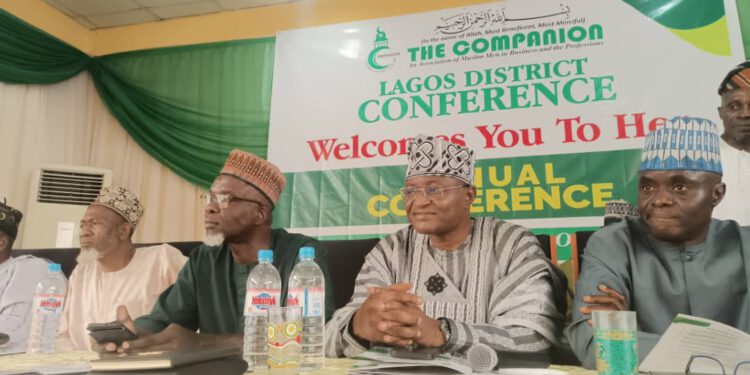The Companion, a group of Muslim men in businesses and professions have called on government at all levels to declare an emergency intervention in Nigeria’s educational sector to save it from imminent collapse and ensure it’s continued contribution to national development.
At the group’s Lagos District annual conference held on Sunday, 22nd October, 2023 under the theme, Education for Sustainable Development, various speakers drew attention to the alarming deterioration of standards in the sector and asked government policy makers to take steps to stem the tide.
In his lead presentation on the topic, Rethinking Tertiary Education Standard in Nigeria, guest speaker Professor Khalid Adekoya of the University of Lagos traced the evolution of tertiary education in Nigeria which revealed how regional politics influenced establishment of many federal and state universities without proper consideration for adequate faculty and other manpower needs.
Prof. Adekoya drew attention to the approval process of most private universities that has been corrupted by profit-seeking proprietors and their collaborators in the approving government agencies. He argued that these factors, coupled with poor remuneration of teachers, inadequate teaching and learning facilities and budgetary under-funding by government are the reasons for the falling standard of tertiary education in Nigeria.
In his address to the conference, the Amir (President) of The Companion, Lagos District, Mr. AbdulKabir Baruwa (FCA), noted that whereas there has been a geometric rise in the number of higher institutions in Nigeria, the quality of graduates from these institutions is generally below par. He also criticized the fixation on the acquisition of university degrees and certificates rather than skills that will enable graduates to compete in the emerging global economy.
The chairman of the conference and deputy managing director of Courteville Business Solutions, Alhaji Thabit Wale Sonaike criticized the outdated curriculum of most Nigerian schools which render their products unemployable in the market place.
An aggregation of the solutions advanced by the various speakers and other contributors at the conference revealed a common trend toward a paradigm shift from a degree-focused education system to a system that prioritizes teaching of practical skills and competences. In this vein, the conference advocated for the retooling and refocusing of polytechnics and universities of technology on the production of skilled and technical manpower for which they were originally established.
The conference also advised government to increase its budgetary allocation to education, provide additional incentives for teachers to remain in Nigeria rather than migrate abroad, and ensure that standards are met before approval licenses are given to private tertiary institutions.
The conference observed that Nigerian students are generally brilliant, gifted and innovative as attested to by the successes many of them achieve when exposed to better educational environments abroad. It concluded that if a similar environment is created at home, many of them will excel and contribute more to national development.
In his closing remarks, the national president of The Companion, Engr. Kamil Olalekan (FNSE) drew attention to the role that Nigerian parents have to play in the educational development of their wards. He admonished parents to teach their children good moral and religious values from their early years so that they will grow up to become God-fearing and conscientious citizens.















